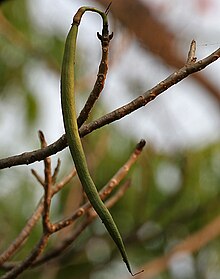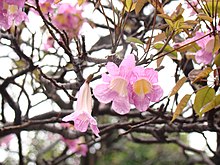Tabebuia heterophylla
| Tabebuia heterophylla | |
|---|---|

| |
| Scientific classification | |
| Kingdom: | Plantae |
| Clade: | Tracheophytes |
| Clade: | Angiosperms |
| Clade: | Eudicots |
| Clade: | Asterids |
| Order: | Lamiales |
| Family: | Bignoniaceae |
| Genus: | Tabebuia |
| Species: | T. heterophylla |
| Binomial name | |
| Tabebuia heterophylla | |
| Synonyms[2] | |
| |
Tabebuia heterophylla is a species of tree native to the Caribbean, and is also cultivated. It is also known as Roble blanco, pink manjack, pink trumpet tree, white cedar, and whitewood.[3]
Description

Tabebuia heterophylla grows up to 20 to 30 feet tall. Leaves are opposite and palmately compound with five or fewer leaflets. T. heterophylla is considered brevi decidius. Flowers are Showy pink, tubular and five lobed (2 to 3 inches long). The flowering time is spring and Summer. Fruit is a seedpod, it splits along 2 lines to shed the numerous thin light brown seeds (1/2 to 1 inch long with 2 white wings).[4]
Wood
This tree is valuable for its timber production and grown for such purposes on plantations. It is commonly harvested from the wild for use locally and for export.[5]Pink manjack is used as a street tree. Its height allows for it to provide lasting shade and as a result it can provide shade for a residential property near the patio or deck. Its floral display allow it to be valued and as a result, it is known as an ornamental tree.
Flower anatomy

The flowers of Tabebuia heterophylla are in an inflorescence of the umbellate type. It is a perfect and complete flower with radial (actinomorphic) symmetry, and the whorls of the corrolla and the calyx are connately joined. The ovary is superior with an axile placentation, two locules and two carpels.
References
- ^ Roberts, A. (2019). "Tabebuia heterophylla". IUCN Red List of Threatened Species. 2019: e.T157815878A157815887. doi:10.2305/IUCN.UK.2019-3.RLTS.T157815878A157815887.en. Retrieved 20 November 2021.
- ^ "The Plant List: A Working List of All Plant Species". Retrieved 17 September 2015.
- ^ "Tabebuia heterophylla". Germplasm Resources Information Network. Agricultural Research Service, United States Department of Agriculture. Retrieved 17 September 2015.
- ^ Little, Elbert Luther; Wadsworth, Frank H. (1964). Common trees of Puerto Rico and the Virgin Islands / by Elbert L. Little, Jr., and Frank H. Wadsworth. Washington, D.C.: U.S. Dept. of Agriculture, Forest Service. doi:10.5962/bhl.title.4135.
- ^ Fern, Ken, and Ajna Fern. “Tabebuia Heterophylla.” No Record - Useful Tropical Plants, Useful Tropical Plants Database, 2014, tropical.theferns.info/viewtropical.php?id=Tabebuia heterophylla.

